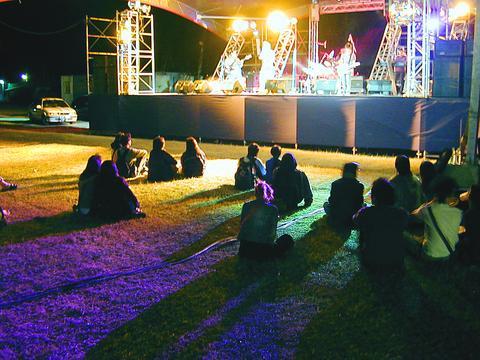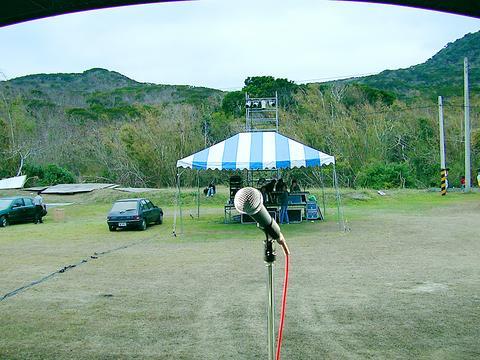On the opening evening of the 10th anniversary of Spring Scream, fewer than 100 people braved blustery weather for the dozen bands that played on two stages.
"I've come to Spring Scream for the past three years," said Teddy Yang, lead singer of My Last Name is Chang, one of the bands scheduled to open this year's Scream.

PHOTO: DAVID MOMPHARD, TAIPEI TIMES
He and his bandmates have been together for all of two months and on Friday they played to an audience of 11 people and two police officers at Leofu Farms outside Kenting township.

PHOTO: DAVID MOMPHARD, TAIPEI TIMES
"I found out we were going to get to play at the festival this year and I was like `yeah!'" Yang said. "Then I found out we'd be one of the first bands to play on the first night and I was like `oh, shit.'"
But if the bands were disappointed that the fields were less than full, it certainly didn't show in their performances, though there were some farcical interludes.
"Stop talking and start playing," one of the members of Little Tiger Team told his bandmate. "People are leaving. We can't afford to lose any more!"
Despite the fact that they were on the reserve list of bands, they went on to draw one of the evening's biggest crowds with a single refrain that they played again and again while wearing tiger-head hats. To finish off their refrain for the last time, one portly member of the band performed a somersault across the stage to the delight of the girls selling Deluxe Beer.
"Wait! We're a band, not a circus!" he said by way of introducing their next number, a slightly off-key ballad that saw most of their audience walk across the field to see what was happening on the second stage.
It was a band called GAIN, which had less trouble staying in tune but couldn't find a single rhythm that everyone agreed on. Their efforts caused the two police officers watching to chuckle.
"They need to practice a bit more," said one of the officers surnamed Chang.
While not the best bands in this year's lineup, taken together, Little Tiger Team and GAIN represent the best of what Spring Scream is about; providing a much-needed venue for local talent to strut their stuff -- even if it is to an audience of mostly friends and fellow
musicians.
That opportunity has proven invaluable in the past. Taiwan's pre-eminent rapper MC Hotdog got his start at Spring Scream as did Mayday, who have gone on to sell over 1 million albums. It's also provided a chance for musicians to meet other musicians and to hear what music others are making.
"I'm looking forward to things picking up," said co-organizer Jimi Moe who founded Spring Scream along with business partner Wade Davis. And pick up it certainly will. Vendors and artists are busy setting up shop in the several tents that dot the field, and other diversions are in the works.
As he spoke, Moe was checking on the progress of an in-line skate ramp being built, a half-pipe that has featured at Spring Scream since the event first came to Leofu Farms. Each year the ramp is nailed together for festival-goers to play on and each year it rots in the rain and wind.
As a sign of just how permanent a fixture Spring Scream has become, this year it's being made from steel.

The Taipei Times last week reported that the rising share of seniors in the population is reshaping the nation’s housing markets. According to data from the Ministry of the Interior, about 850,000 residences were occupied by elderly people in the first quarter, including 655,000 that housed only one resident. H&B Realty chief researcher Jessica Hsu (徐佳馨), quoted in the article, said that there is rising demand for elderly-friendly housing, including units with elevators, barrier-free layouts and proximity to healthcare services. Hsu and others cited in the article highlighted the changing family residential dynamics, as children no longer live with parents,

It is jarring how differently Taiwan’s politics is portrayed in the international press compared to the local Chinese-language press. Viewed from abroad, Taiwan is seen as a geopolitical hotspot, or “The Most Dangerous Place on Earth,” as the Economist once blazoned across their cover. Meanwhile, tasked with facing down those existential threats, Taiwan’s leaders are dying their hair pink. These include former president Tsai Ing-wen (蔡英文), Vice President Hsiao Bi-khim (蕭美琴) and Kaohsiung Mayor Chen Chi-mai (陳其邁), among others. They are demonstrating what big fans they are of South Korean K-pop sensations Blackpink ahead of their concerts this weekend in Kaohsiung.

Taiwan is one of the world’s greatest per-capita consumers of seafood. Whereas the average human is thought to eat around 20kg of seafood per year, each Taiwanese gets through 27kg to 35kg of ocean delicacies annually, depending on which source you find most credible. Given the ubiquity of dishes like oyster omelet (蚵仔煎) and milkfish soup (虱目魚湯), the higher estimate may well be correct. By global standards, let alone local consumption patterns, I’m not much of a seafood fan. It’s not just a matter of taste, although that’s part of it. What I’ve read about the environmental impact of the

Oct 20 to Oct 26 After a day of fighting, the Japanese Army’s Second Division was resting when a curious delegation of two Scotsmen and 19 Taiwanese approached their camp. It was Oct. 20, 1895, and the troops had reached Taiye Village (太爺庄) in today’s Hunei District (湖內), Kaohsiung, just 10km away from their final target of Tainan. Led by Presbyterian missionaries Thomas Barclay and Duncan Ferguson, the group informed the Japanese that resistance leader Liu Yung-fu (劉永福) had fled to China the previous night, leaving his Black Flag Army fighters behind and the city in chaos. On behalf of the